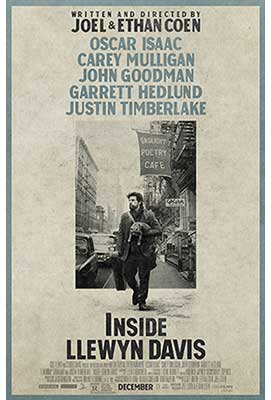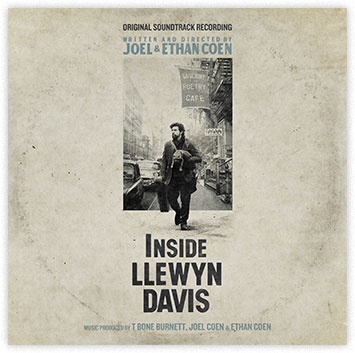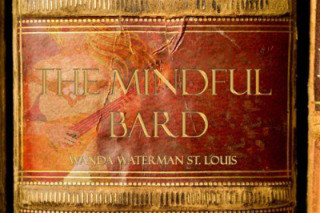 Film: Inside Llewyn Davis
Film: Inside Llewyn Davis
Directors: Joel and Ethan Coen
? . . . because wherever I sat? on the deck of a ship or at a street café in Paris or Bangkok? I would be sitting under the same glass bell jar, stewing in my own sour air.?
– Sylvia Plath
Watching Inside Llewyn Davis is like walking through a bombed-out city on a winter’s night in the company of your shadow self, who just can’t seem to stop talking about what a big fat nothing you are.
I really didn’t expect this. After having written about the soundtrack, made available before the film, I’d assumed this would be either a delightfully comic showcase of American roots music like O Brother, Where Art Thou? or a dark comedy à la Barton Fink. Wrong on both counts. Although this has been billed in part as a comedy, the rare funny moments are at the same time so sad they make you feel ashamed for laughing.
I’d also believed it might take me back to my own memories of the coffeehouse culture, but every speck of the heady joy of that era was sucked right out of the story. Imagine a film about the sixties with no paisley, no bellbottom blue jeans, no marijuana, no politics, no misguided optimism, no peace, and no love, and you’ve got yourself Inside Llewyn Davis. Not to mention that the ghastly spectre of military service is a significant backdrop? it keeps appearing like a black hole ready to swallow any man who can’t live his dream.
That’s what’s so brilliant. The Coen brothers remove all the distracting conventional historical props to reveal the angst of one small pocket of urban America in the sixties, turning what could have been a docudrama into a mythic (folk) hero’s tale.
This isn’t to say that the film has no historic veracity (I highly recommend the background articles found on the film’s official website); the story line picks up lots of authenticity points by including a number of real events from the life of Dave Van Ronk, one of my all-time favourite folkies.
Lead, Oscar Isaac, superbly recreates these events, which amount to a desperate struggle rewarded only by an endless string of bad luck. He gives achingly beautiful performances of traditional songs, performances rendered all the more poignant because nobody gets them; It’s like he’s playing to a herd of staring cattle. If you’ve ever poured out your heart to an audience only to be ignored or misunderstood, these scenes will break your heart.
The amazing thing is that he keeps on seeking gigs, like a Sisyphus cursed to keep climbing the stage only to bomb, again and again, for eternity.
Llewyn Davis is clearly depressed. He’s an empty floating balloon with no connection to the past and little inclination to connect to the future. The urban landscape that he moves through doesn’t even have enough of the milk of human kindness to keep a gnat emotionally healthy, and on the rare occasions when he does meet good decent people all he can do in his despair is to mock and insult them, like a dying man raging with jealousy toward the living.
Llewyn manifests in his person the effects of one of those decadent periods in which one culture must die away to make room for the new. In this case the clean-cut, wholesome, hopeful, and popular folk movement that grew to popularity in the late fifties? which included mostly duos, trios, and quartets belting out buoyant harmonies about the working class and wanderin? and holding the man to account? was no longer seen as relevant or sincere.
The newly emerging folk music pointed with every finger in the direction of authenticity, whether that meant seeking out real American roots musicians and adopting their style (Bob Dylan, Dave Van Ronk, Joan Baez) or being fearlessly sincere about one’s personal experience ( Joni Mitchel, Leonard Cohen, Neil Young).
Llewyn is now making that shift himself, but he doesn’t know it yet. His first record, as part of a squeaky clean folk duo, was called If I had Wings. His most recent recording is called?you guessed it?Inside Llewyn Davis. He has unwittingly moved in the direction of deeper introspection, though he’s a long way from making it pay off.
In one sense, this is a film about the experience of depression through the eyes of someone who refuses to be ruled by it. You’ll ask yourself, again and again, ?how much more pain can this guy take before he collapses?? In the end, we see him ready once again to climb that stage and bomb once more. Is he a hero? Albert Camus would say so.
Inside Llewyn Davis manifests four of the Mindful Bard’s criteria for films well worth seeing:
It’s about attainment of the true self.
It inspires an awareness of the sanctity of creation.
It displays an engagement with and compassionate response to suffering.
It makes me appreciate that life is a complex and rare phenomena, making living a unique opportunity.


